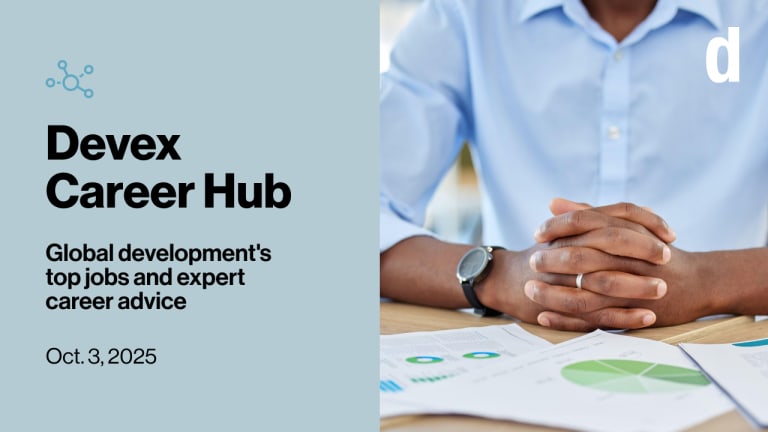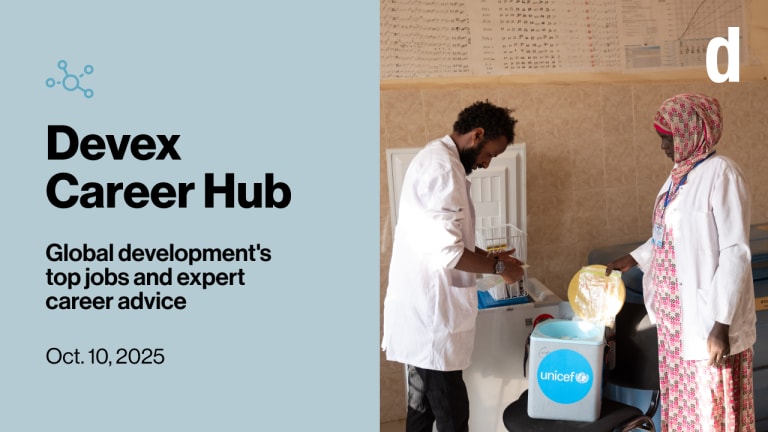
Global development organizations are frequently looking for consultants to provide technical expertise on projects or support them in other business functions.
Possessing an in-demand skill set will help you to carve out a career as an independent consultant — thus enjoying the perks of a flexible working schedule and picking your projects and clients. Still, working as an independent consultant can be as challenging as it is rewarding. For starters, many consulting jobs are not posted externally, so you need to be constantly reaching out to your network to find out about opportunities.
Devex's top career advice from 2018
From job search basics to knowing exactly the skills you’ll need to land that next development job, find out exclusive insights into the latest hiring trends, career tips, and advice from development experts over the past year.
From tips on setting your rate and negotiating contract terms to insights on working with specific institutions, Devex takes a look back at our top advice from 2018 to help you succeed as an independent consultant.
1. Your guide to becoming a global development consultant
Establishing yourself as an independent consultant can be particularly tricky. You need to know how to effectively market your expertise and find new clients. Setting your daily rate and negotiating your contract can also be a struggle for those who are just getting started in the gig economy.
Daniel Head and Susanne Barsoum, co-founders of KeyLime International, join Devex to tackle some of the common and unique challenges that come with launching a career as an independent consultant. In this webinar, the pair provides insights on how to better brand your skills, understand what the market rate is for your services, and find new opportunities.
2. Your guide to a standout consulting CV
The project-based nature of global development means that independent consultants often have a lot to fit onto their CV. It’s therefore important to make sure that your key skills and accomplishments stand out so that an employer can quickly see why you are a good fit for a project.
In this webinar, Kate Warren, executive vice president of Devex, talks through the basic elements of a standout consulting CV. Warren discusses the importance of utilizing your headline and key qualifications section to brand your expertise and experience. She also shares tips on how to tailor your CV to specific projects and clients, and focus on the results you have helped achieve.
3. Building and maintaining an online presence
Whether it's your Devex profile, a blog or a website, maintaining a strong online presence is critical to succeeding as an independent consultant. This not only helps employers find you, but allows you to really highlight your areas of expertise.
Yvette Gonzalez, independent consultant and managing director of Gonzalez Global Solutions, talks about the importance of keeping your online profiles up-to-date and building your brand through blogging. She also discusses some of the ways you can use platforms such as Twitter to let others know what you are working on and shares tips for maintaining a professional presence when using these sites.
4. A guide to consulting with the World Bank
Most consulting jobs at the World Bank are not advertised and hiring managers often rely on their network to find professionals with the right expertise for short-term projects. That’s according to Roberto Amorosino, human resources specialist with the bank, who joins Devex to discuss the importance of engagement in landing a consulting gig with the institution.
Amorosino shares his recommendations for successful professional engagement and provides insights on favored CV formats and the bank’s assignment policies.
5. A guide to consulting with USAID
One of the biggest challenges for independent consultants can be finding opportunities with big agencies such as the U.S. Agency for International Development. You have to be “constantly listening,” says Yvette Gonzalez, from Gonzalez Global Solutions, during this Devex webinar.
Reflecting on her own experience, including working on numerous USAID-funded projects, Gonzalez shares advice for introducing yourself to organizations and seeking information on opportunities. She also tackles some of those common consulting challenges such as calculating your worth and knowing when to say no to projects.
6. A guide to consulting with EuropeAid
Sibylle Koenig, senior development consultant, provides a basic overview of the framework contract, the procurement tool the European Union uses for large-scale EuropeAid service contracts, as well as tips for knowing the top contractors working with the agency.
Koenig shares her recommendations for how and where to find out about expert opportunities, and approach contract negotiations. She also stresses the importance of networking which is key for consultants looking to get their foot in the door at EuropeAid.
7. Advice for career transitioners
Consulting can be a great way to break into global development if you are transitioning from another sector and possess in-demand skills such as private sector expertise. Still, it is important though that you translate your skills and experience in a way that resonates with global development employers.
In this webinar, Craig Zelizer, founder and CEO of PCDN, and Anne Steen, executive director at Georgetown's University Graduate Career Center with the Walsh School of Foreign Service, share their advice for career transitioners, including those professionals who are looking to kick off their consulting career.
The pair tackle some of the biggest challenges of a career move such as figuring out where you fit within the development sector, how to leverage your network to find out about opportunities, and effectively telling your story.








